What Is MCT Oil? The Ultimate Guide to MCT Oil Supplements
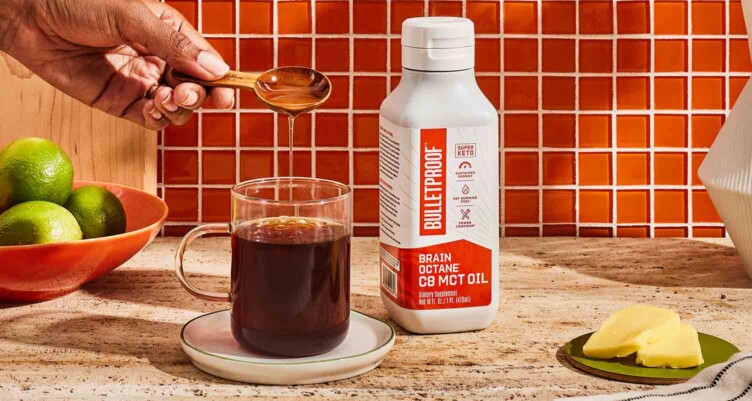
- What is MCT oil? It’s a quality fat found in coconut oil. It helps your body makes ketones, which burns into energy.
- There are different types of MCTs, with varying effects on your body. Your body gets many benefits from C8, the most ketogenic MCT.
- You can easily add MCT oil to coffee or various other recipes.
What is MCT oil? MCT stands for medium-chain triglyceride oil. Triglycerides are the molecules that make up most fats. MCTs are found in coconut oil, palm oil, goat milk and even breast milk. MCT oil is an easy-to-digest source of energy that you can add to your smoothies, recipes and coffee. You may be familiar with Bulletproof coffee, our MCT-rich drink that’s a great addition to the keto diet.
Discover everything you need to know about MCT oil, its benefits and how you can incorporate it into your daily routine.
What is MCT oil?
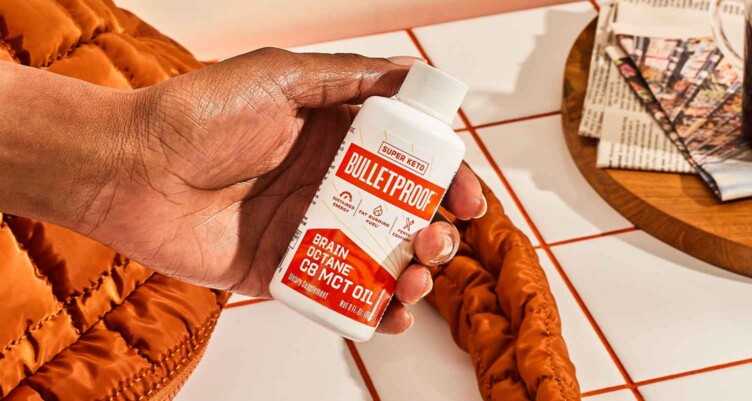
MCT oil is a quality fat that comes from coconut and it is a nutritional source of ketones. Ketones are the primary source of energy when you’re on the keto diet. Ketones are a great source of brain-supporting fuel. Bulletproof’s Brain Octane C8 MCT Oil has been proven to contribute to better cognitive stability in a 2022 study on Alhzeimer’s patients.[1]
If you’re following a ketogenic diet, supplementing your food intake with MCT oil may help you get more quality fat in your diet and boost ketone production. With more ketones in your system, you can feel fuller, longer[2] and improve cognitive performance,[3] among other benefits.
How does MCT oil work?
Most of the fats you eat are long chain triglycerides (LCTs), whereas MCTs are made up of smaller molecules that are easier to digest.[4] MCTs get absorbed directly into your liver through your bloodstream. The liver converts them into ketones, the fuel source your body produces when it burns fat for energy.
MCT oil health benefits
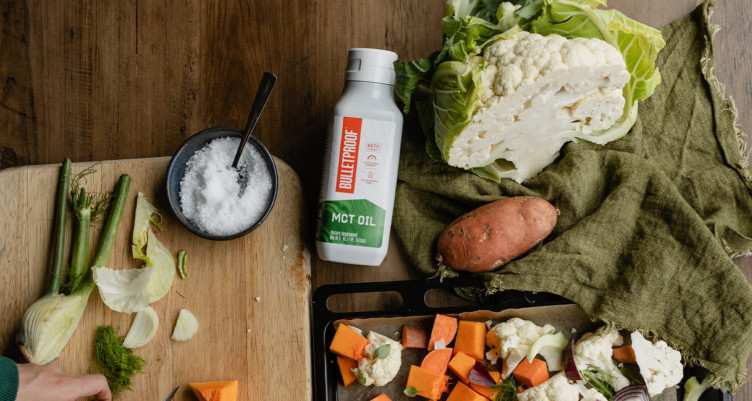
MCT oil was first produced in the United States in the 1950s and has since been subject to numerous studies exploring its benefits. Although research is ongoing, some promising studies suggest ways MCT oil benefits can help contribute to a healthy lifestyle.
Sustained energy
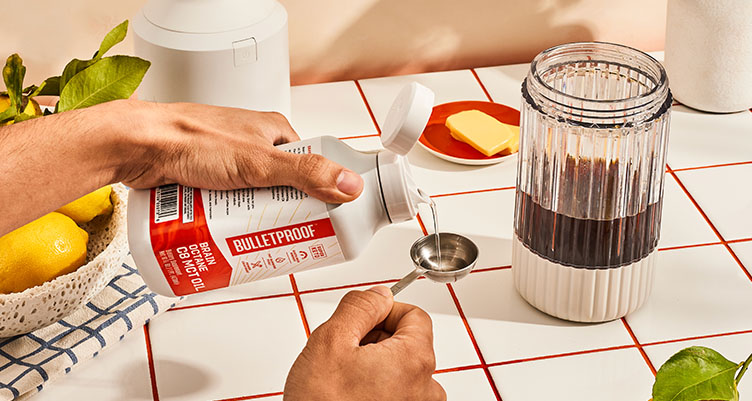
High-quality MCT oil turns into ketones within minutes, which provides your brain with a quick energy source.[5] Unlike long-chain fatty acids, which need to be broken down in the digestive system and transported through the bloodstream, MCTs go directly to the liver, where they can be converted into fuel. What this means is, if your body is low on energy stores, your own natural metabolic systems can fast-track MCT oil into an energy source that’s immediately available for your brain.
Weight management

If you’re following the keto diet, MCT oil can help your body stay in the fuel-burning state called ketosis. In this state, your body turns MCTs into ketones which means it burns fat for energy instead of carbs. Being in a state of ketosis can promote weight loss, increase satiety and decrease hunger.[6]
And although MCT oil and keto are a perfect match, you don’t have to follow the keto diet to enjoy MCT oil benefits. MCTs can induce ketosis even if you’re not on the keto diet or fasting.[7]
Fewer cravings
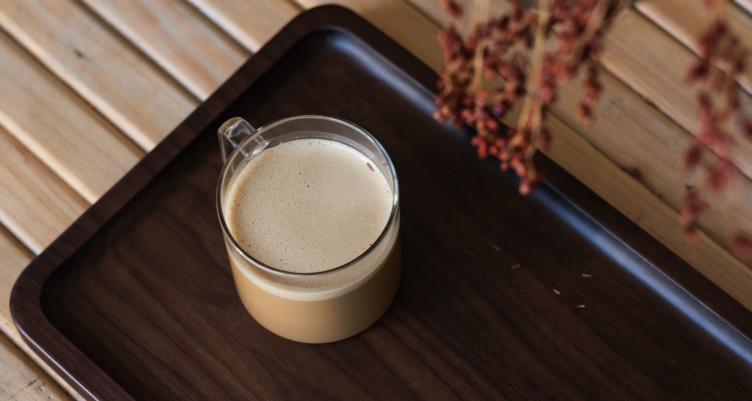
MCT oil has the potential to increase satiety compared to long-chain triglycerides (LCT).[8] Feeling fuller means less snacking, which can contribute to weight loss.
How does MCT oil help you feel fuller? MCTs raise ketones in your body. Ketones suppress your hunger hormone (called ghrelin) and increases cholecystokinin (CKK), which makes you feel full.[9]
This is part of the reason why Bulletproof Coffee works so well. It’s made with Bulletproof Brain Octane C8 MCT Oil, which contains 100% caprylic acid triglycerides, harvested from the most ketogenic-rich part of the coconut.
Gut support

In a recent animal study, MCTs had a protective effect in the small intestine, suggesting anti-microbial properties.[10] In other words, MCTs can help the gut block unhealthy toxins and bacteria from entering the bloodstream and putting you at risk of illness. Having a healthy gut can contribute to a better immune system as well as many other benefits.[11]
What is MCT oil made of?
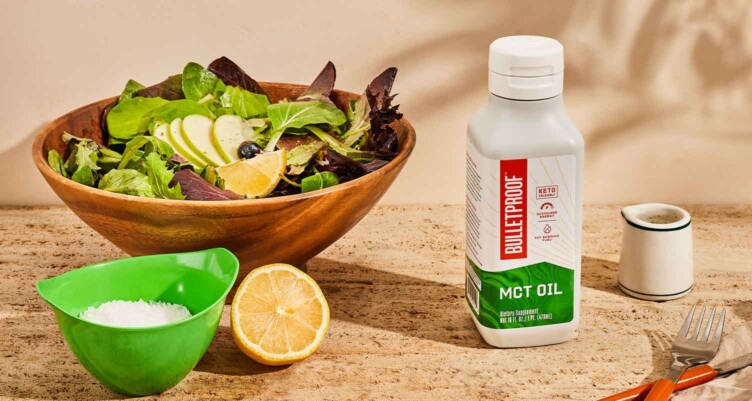
How do medium-chain triglycerides compare to short-chain triglycerides (SCTs) or long-chain triglycerides (LCTs)? The chain refers to the triglyceride carbon atom chain, which is like a tail off the end of the molecule.
Short-chain triglycerides are made up of less than 6 carbon atoms. Medium-chain triglycerides have between six and 12 carbon atoms. And long-chain triglycerides have at least 12 carbons. The longer the chain, the longer it takes your body to turn those triglycerides into energy.
Here’s a summary of the different types of MCTs:
Caproic acid (C6)
C6 is a MCT that can quickly convert to ketones, but it has a strong taste and small, so it is often removed from MCT oil.[12] Plus, MCT oil side effects with C6 may include an upset stomach.[13]
Caprylic acid (C8)
Brain Octane C8 MCT Oil is 100% C8 caprylic acid. It makes up around 6-7% concentration in coconut oil. It is a great source of ketonic energy because it can quickly create a powerful cellular fuel that’s antimicrobial and antifungal.[14]
Capric acid (C10)
This is the second shortest form of MCT. It takes more time to turn into ketone energy, but it’s more affordable than C8. In coconut oil, there’s about 7% concentration of C10.
Bulletproof MCT Oil is a blend of C8 and C10 MCT oils, so it’s more budget-friendly than Brain Octane C8 MCT Oil, but still meets Bulletproof’s rigorous quality standards for purity.
Lauric acid (C12): ~49% of coconut oil
C12 is what you’ll mostly find in coconut oil, as it makes up around 49% in concentration. But surprisingly, your body doesn’t treat it like an MCT. Rather than immediately getting converted into energy, lauric acid requires processing in the liver and takes longer to metabolize.[15] This is why it is more accurately described as a long-chain triglyceride (LCT), not an MCT.
Lauric acid is not the same as monolaurin, an extremely potent antimicrobial that is derived from lauric acid. Lauric acid has a few antimicrobial benefits,[16] but because it takes longer to process, it is not as efficient to fuel your brain and body as C8 and C10 MCTs.
Coconut oil is an affordable source of lauric acid. Learn more about the difference between MCT oil and coconut oil.
C-14 and Above
These are LCTs, and they refer to the other fats in coconut oil. The exact percentage of LCTs in coconut oil depends on variables like the region the coconut was grown in and its time of harvest.
LCTs are good as a fuel source, but they are also widely available in other oils, and you won’t benefit from eating a lot more of them compared to eating true medium chain fatty acids. Plus, MCTs help your body make ketones faster than LCTs.[17]
Whether you follow the keto diet or just want more energy, Brain Octane C8 MCT Oil and MCT Oil can provide you with many ketogenic benefits. They are some of the best MCT oils on the market.
MCT Oil vs MCT Powder

MCT oil powder is a convenient way to bring MCTs on the go, but how does it compare to MCT oil? Are the MCT oil benefits the same? It depends on your preferences and the MCT oil powder you choose.
One benefit of MCT oil is that it doesn’t require a carrier or extra additives. For instance, Brain Octane C8 MCT oil is 100% triple-distilled C8 MCT oil. It’s expeller-pressed, sourced completely from coconuts and it isn’t mixed with any unnecessary chemicals. Learn more about what makes Bulletproof MCT oils different.
MCT oil powder is produced via a process called spray drying, in which MCT oil is sprayed onto a carrier material, which forms a powder.
So, when you’re considering MCT oil powders, think about the following:
- What type of MCT oil are you getting? C8 is the best MCT oil because your body most easily converts it into ketones. C10 is a close runner-up. The manufacturer should disclose what type of MCT you’re getting in your powder, usually on the nutrition label. Bulletproof uses a mix of Brain Octane C8 MCT Oil or C8 and C10 MCT Oil, depending on the product.
- What is the carrier powder? Some carrier powders will actually hinder ketosis because they increase your insulin levels with added ingredients like maltodextrin or glucose additives. Acacia gum and resistant dextrin are keto-friendly choices you’ll find in Bulletproof products.
- What is the MCT oil made from? MCT oil is also found in palm kernel oil. These industries contribute to deforestation, exploitation of workers and endangers animals.[18]
- Bulletproof MCT oils are sourced from coconuts, a more sustainable choice.
- What are the other ingredients? If it’s flavored, make sure the manufacturers haven’t added artificial sweeteners or extra sugar. Bulletproof products with MCT oil powder use plant-based sweeteners like stevia. We never use artificial sweeteners.
- How much fat is there? Because each serving also contains a carrier powder, you might not consume as much fat as you would if you used liquid MCT oil alone. Double-check how much dietary fat you get per serving. Bulletproof Original Creamer clearly states that each serving contains 10 grams of quality fat from MCT oil and grass-fed butter.
Another note on carrier powders: Acacia gum and resistant dextrin are great carriers because they’re actually good for your gut.[19] Acacia gum, the carrier powder used in Bulletproof Original Creamer, is a resistant starch. Although it’s technically a carbohydrate, resistant starch isn’t digested by your body. Instead, it functions as a prebiotic, which feeds your good gut bacteria.[20]
MCT oil powder is convenient, but the ingredients matter. If you want to add MCTs to your diet in powder form, make sure it doesn’t include added sugars or artificial fillers.
Ways to Use MCT Oil
What’s the best way to use MCT oil? It has a low smoke point (about 320°F), so it’s best not to cook with it. But it’s easy to use as an add-in for anything from smoothies to salad dressings. Here are a few ideas:
- Combine Brain Octane C8 MCT Oil, grass-fed butter or ghee and coffee to make a creamy cup of Bulletproof Coffee. MCT oil in coffee is a great way to start the day.
- Try this nourishing and satisfying Berry Matcha Smoothie, featuring coconut milk, MCT oil, berries and Bulletproof InnerFuel Prebiotic.
- Make one of these delicious MCT oil salad dressings to boost your salad’s nutritional value. MCT oil stays liquid in the fridge and at room temperature, so make a big batch of Keto Ranch Dressing and enjoy it all week.
- Need to take your supplements on the go? Bulletproof Brain Octane C8 MCT Oil Packets or Brain Octane Softgels are travel-friendly.
- For more ideas, try one of our many MCT oil recipes. You’ll find ideas for every meal, from breakfast to dessert.
Sign up for early access to sales, product launches, the latest Bulletproof news and more!
This article has been updated with new content.



